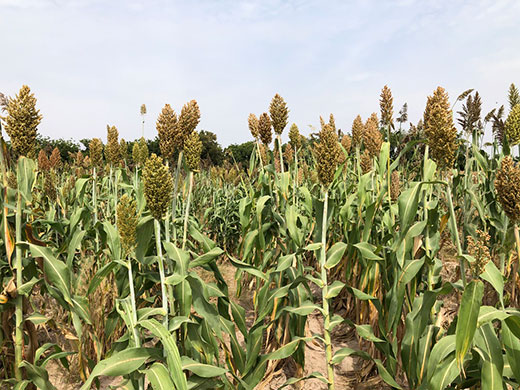
Researchers in the Sorghum and Millet Innovation Lab at Kansas State University have received an award for $750K to improve the resiliency of sorghum and millet production in Madagascar. | Download this photo.
K-State Innovation Lab lands $750K award to study sorghum, millet in Madagascar
Project will assess value chain in country hit hard by climate, drought
Oct. 11, 2022
By Pat Melgares, K-State Research and Extension news service
MANHATTAN, Kan – Researchers in a Kansas State University innovation lab that develops technologies to improve the resiliency of sorghum and millet production have received $750,000 to spur the crops’ production and value in Madagascar.
Officials with the Feed the Future Innovation Lab for Collaborative Research on Sorghum and Millet (SMIL) said the project will take a look at every aspect of the value chain – from production in farmer’s fields to its eventual use in food and other products – in hopes of addressing the crippling effects of climate and drought in that country’s sorghum industry.
“Madagascar faces numerous challenges in the face of climate change impact and the urgent need for sustainable economic development,” said Kira Everhart-Valentin, the lead sorghum value chain specialist on the project.
Everhart-Valentin said sorghum – as a resilient and climate-smart cereal crop -- has “a promising role to play in expanding opportunities in food security and environmental conservation, while also helping to enhance growth in the private sector.”
“This project will identify the strategic entry points for prioritizing investments and accelerate the development of Madagascar’s sorghum value chain in a way that brings impact and value to local communities,” Everhart-Valentin said.
The challenges currently faced by farmers in Madagascar are familiar to researchers in SMIL’s global network: climate change, degradation of the environment and lack of economic opportunity.
Everhart-Valentin said multiple years of extreme drought have left more than 1 million people in Madagascar at high risk for malnutrition and severe income insecurity – particularly in the island nation’s southern regions.
“Drought has also created significant challenges to traditional agricultural production systems upon which nearly 80% of the population relies for their livelihoods,” she said.
The $750,000 award from the U.S. Agency for International Development will help project members better understand the potential opportunities for growing sorghum in Madagascar. Everhart-Valentin said the work proposes further diversifying the existing farming systems in response to environmental, product and market challenges that smallholders and the local food system currently face.
The project will also explore the potential of adding value to sorghum production by connecting it to the livestock feed sector, where there is currently challenges associated with the supply of traditional feed ingredients.
Timothy Dalton, director of SMIL, said the project is an example of leveraging the lab’s international sorghum network and foundation in cutting-edge research and technology to fast track this project.
“Madagascar is yet another challenging environment and we hope to contribute to the development of new opportunities for rural income, more efficient livestock systems and increase resilience of the food system to environmental and economic shocks,” he said.
Everhart-Valentin said the project, which began in early September, will help to inform sorghum production in the United States – particularly in semi-arid agriculture regions – as well as contribute to global marketing opportunities.
More information on this and other SMIL projects is available online.

